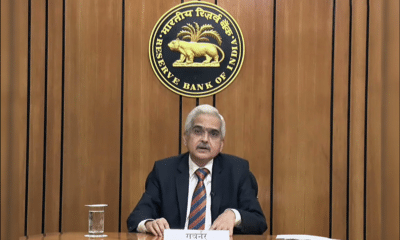Banking
Credit guarantee scheme from govt needed for startup loans: SBI economists after change in RBI norms
SBI economist explained that startups do not have collateral and performance evaluation mechanism matrix. Hence, it will be interesting to see how the lenders can diversify their risk appetite while lending to startups which do not meet traditional security/collateral/cash flow requirements
Startups lack collateral against which loans can be availed, and a credit guarantee scheme is essential to ensure that benefits of the Reserve Bank’s new priority sector lending reach the new-age enterprises, economists at SBI said on Friday. Other measures of the newly drafted guidelines of RBI, like moves to address regional disparities in credit and loans to farmers for installing solar plants, were welcomed by the economists.
Earlier in the day, the Reserve Bank of India came out with revised guidelines for priority sector lending (PSL) which included lending of up to Rs 50 crore to startups to be included in the priority sector portfolios. Banks are mandated to lend over 40 per cent of their advances to priority sectors and penalised with parking the shortfall in low interest-earning instruments.
The SBI economist explained that startups do not have collateral and performance evaluation mechanism matrix. Hence, it will be interesting to see how the lenders can diversify their risk appetite while lending to startups which do not meet traditional security/collateral/cash flow requirements.
Also read: India’s GDP lowest in 24 years, contracts 23.9% in Q1 of 2020-21
“We believe a suitably structured guarantee scheme from the government could be helpful in the current scenario to give an impetus to lend to startups,” they said in a note.
Analysts at ratings agency Crisil said the revision would incentivise credit flow to specific segments like clean energy, weaker sections, health infrastructure and credit deficient geographies.
The note from SBI economists said the last revision in norms had significantly improved achievement of PSL targets by banks and in FY20, all the bank-groups have been able to achieve the overall target of 40 per cent lending, including the foreign lenders.
Other welcome changes include loans to farmers for installation of solar power plants for solarisation of grid-connected agriculture pumps and loans for setting up compressed biogas (CBG) plants as fresh categories eligible for finance under PSL, it said.
They hailed the move to take care of regional disparities as “an ideal example of policy federalism” adopted by RBI in promoting financial and social inclusion in line with the central government’s agenda.









































Pingback: SBI Q2 net profit jumps 55 pc to Rs 5,246 cr as bad loans decline